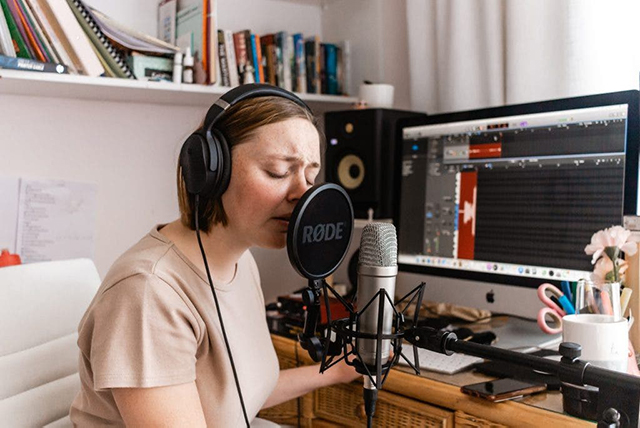Every flat hard surface reflects the sound, like bouncing ball from the wall. When you speak, the sound hits the wall and bounces back and then gets back to the microphone. It’s important to treat the first reflection so that if you speak, the sound is going to be clearer. If the first reflection goes to microphone, the recording can be muddy and not recognizable.
Porous materials are sound absorbers, they do not reflect sound. Foam or Fibers (sound blankets have fibers), Rockwool, Glasswool – those are example of porous sound absorbers.
Imagine blowing an air into a bunch of strings, those strings are going to start moving and it will absorb the energy. So the air motion stops because it spends it’s energy on vibrating all those strings. Same happens to the sound – it loses it’s energy (it transforms to heat energy).
Acoustic foam have “open channels”. When the sound gets into the foam it bounces from one wall to another as it goes through the channels, loosing its energy.
Acoustic panels are advantageous in many ways: it’s easy to install (no glue required) and integrate into any home or office décor. You can print anything you like directly on the panel. It could be a picture, photo or simple, pure panel without imprint (white, black or grey).
Diffusion and Direct Sound
Imagine when you throw a ball in a bookshelf on a wall or uneven surfaces. You won’t know where exactly it would go. Diffuser is some kind of odd shape hard object. Some is made of wood material, sticking out at different length, some is made in a special shape or angle.
The idea is that if the reflective surface is not flat then the sound is going to be reflected in different angles. The energy of the sound remains the same but it becomes scattered.
Direct sound is the sound that goes directly from a sound source (voice’s actor mouth) to a microphone. It’s your choice to have either “DEAD” or “LIVE” room. In “DEAD” room all the walls and even ceilings should be covered with acoustic panels so nothing reflects back. Voice actor wants the room to be as dead as possible. However, it’s not ideal for singers and musicians. Singers want a little bit of a Live Room so it won’t sound dull or artificial.
Why it’s important to treat the room acoustically?
To get clear sound recording, it’s important to have a room that doesn’t have any interfering sound, such as outside noise or sound reflections.
When actors and musicians try to create a recording studio, they’re obsessed with getting best microphone and expensive sound editing software. But the best microphone is more sensitive to the way the room sounds! Unlike humans, microphones don’t have the same ability to select correct sound, they record everything that reaches it’s membrane.
Sound reflections coming with slight delay after direct sound will overlap and will cause the recorded sound to be inaudible. Professionals pay very close attention to how their room sounds.
Acoustic panels will diffuse reflections, absorb and improve your sound in any room. It’s simple and fast acoustic solution for any home recording studio.
